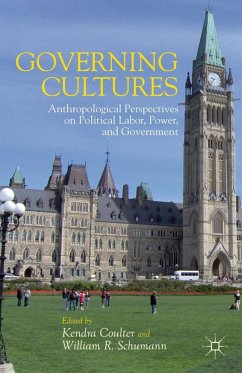"A groundbreaking collection of innovative studies of the complicated doing of governing, Governing Cultures is essential reading for anyone - in anthropology, sociology, geography, political science, or policy science - interested in productions and relations of labor, power, and meaning in government. Coulter and Schumann bring together analyses of the heterogeneous specificities of governing cultures and cultures of governing that together lay the theoretical and methodological foundations for a much needed new anthropology of government." - Catherine Kingfisher, professor, Department of Anthropology, University of Lethbridge
"This collection provides a fascinating exploration of the work of governing from an anthropological perspective. It presents a range of detailed ethnographic studies which engage with theories of governmentality and the state, and illustrates that the practice of governing is infinitely more contested than theoretical abstraction implies. The empirical focus is wide-ranging and international including discussions of food security, how governments and governing are gendered, the work involved in creating political identities for nations and states, and how indigenous peoples engage with processes of governing. It includes historical analyses as well as more contemporary ethnographic research and is an important contribution to our understanding of the process of government in all its messiness and complexity." - Nickie Charles, professor,Department of Sociology and Director of the Centre for the Study of Women and Gender, University of Warwick
"This collection provides a fascinating exploration of the work of governing from an anthropological perspective. It presents a range of detailed ethnographic studies which engage with theories of governmentality and the state, and illustrates that the practice of governing is infinitely more contested than theoretical abstraction implies. The empirical focus is wide-ranging and international including discussions of food security, how governments and governing are gendered, the work involved in creating political identities for nations and states, and how indigenous peoples engage with processes of governing. It includes historical analyses as well as more contemporary ethnographic research and is an important contribution to our understanding of the process of government in all its messiness and complexity." - Nickie Charles, professor,Department of Sociology and Director of the Centre for the Study of Women and Gender, University of Warwick








